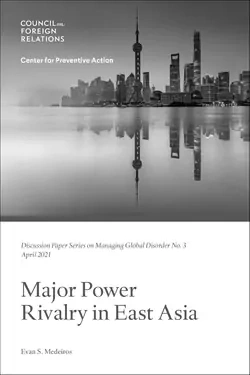
Major Power Rivalry in East Asia

In an era of intensifying U.S.-China friction and volatility, the risks of conflict are real and growing in East Asia, and U.S. policymakers should revitalize existing tools and build new ones to manage an increasingly militarized competition.
- Report
Overview
What idea—or set of ideas—will drive national security policy under the Joe Biden administration? The Donald Trump administration defined great power competition as the organizing principle of U.S. national security policy, framing the U.S.-China relationship in terms of strategic competition. The Biden administration’s early statements and actions indicate it has accepted this frame—but that its policies toward China will differ substantially from its predecessors.
How the Biden administration will actually pursue such competition with China is now a paramount question. The United States’ core challenge right now is to not only deter a range of China’s behaviors but also avoid catastrophic conflict—while still advancing U.S. economic interests. Biden’s advisors have previously written about pursuing a policy of “competitive coexistence” with China, but how to achieve such a delicate balance remains an open question.
More on:
Policymakers and analysts need to devote more energy and time to identifying and weighing risks of strategic competition—bilaterally, regionally, and globally—before determining the risks and costs the United States and its allies can and should assume to shape and deter China without provoking armed conflict. In other words, conflict prevention is only becoming more central to U.S.-China relations as competition becomes the defining frame for U.S. policy.
The U.S.-China relationship currently finds itself in a precarious state, and U.S.-China competition is intensifying: in particular, the relationship is assuming an overtly ideological dimension, which will only accentuate distrust and deepen the interest-based competition on both sides. Several immediate conflicts—including Taiwan and maritime disputes—could escalate. These issues also exist against the background of an accelerating arms race between the U.S. and Chinese militaries in the western Pacific.
Even if the Biden administration adopts a less overtly confrontational approach toward China, the risks of conflict are real and growing. Henry Kissinger famously stated in 2019 that the U.S. relationship with China was “at the foothills of a Cold War.” Kissinger would perhaps modify that claim today—namely, to say that the U.S.-China relationship is now beyond the foothills and into more treacherous mountain terrain. As U.S. and Chinese policymakers move into such terra incognita, they will need to embrace the daunting challenge of revitalizing the existing tools for managing distrust, reducing the risks of accidents and miscalculations, and generally curbing intensifying U.S.-China competition.
This is the third Discussion Paper in the Managing Global Disorder series, which explores how to promote a stable and mutually beneficial relationship among the major powers that can in turn provide the essential foundation for greater cooperation on pressing global and regional challenges.
This Discussion Paper was made possible by a grant from Carnegie Corporation of New York. The statements made and views expressed are solely the responsibility of the author.
More on:
Read this report in Chinese / 阅读本报告的中文版
Read this report in Russian / Читать этот отчет на русском языке
Professors: To request an exam copy, contact [email protected]. Please include your university and course name.
Bookstores: To order bulk copies, please contact Ingram. Visit http://ipage.ingramcontent.com, call 800.937.8200, or email [email protected]. Include ISBN 978-0-87609-379-5.
 Online Store
Online Store